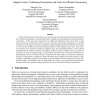Free Online Productivity Tools
i2Speak
i2Symbol
i2OCR
iTex2Img
iWeb2Print
iWeb2Shot
i2Type
iPdf2Split
iPdf2Merge
i2Bopomofo
i2Arabic
i2Style
i2Image
i2PDF
iLatex2Rtf
Sci2ools
148
click to vote
IEEEPACT
2009
IEEE
2009
IEEE
Adaptive Locks: Combining Transactions and Locks for Efficient Concurrency
Transactional memory is being advanced as an alternative to traditional lock-based synchronization for concurrent programming. Transactional memory simplifies the programming model and maximizes concurrency. At the same time, transactions can suffer from interference that causes them to often abort, from heavy overheads for memory accesses, and from expressiveness limitations (e.g., for I/O operations). In this paper we propose an adaptive locking technique that dynamically observes whether a critical section would be best executed transactionally or while holding a mutex lock. The critical new elements of our approach include the adaptivity logic and cost-benefit analysis, a low-overhead implementation of statistics collection and adaptive locking in a full C compiler, and an exposition of the effects on the programming model. In experiments with both micro- and macro-benchmarks we found adaptive locks to consistently match or outperform the better of the two component mechanisms (mu...
Adaptive Locks | Distributed And Parallel Computing | IEEEPACT 2009 | Programming Model | Transactional Memory |
Related Content
| Added | 19 Feb 2011 |
| Updated | 19 Feb 2011 |
| Type | Journal |
| Year | 2009 |
| Where | IEEEPACT |
| Authors | Takayuki Usui, Reimer Behrends, Jacob Evans, Yannis Smaragdakis |
Comments (0)

